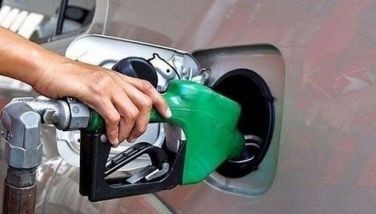Oil firms roll back oil prices by 50¢
September 16, 2006 | 12:00am
Pump prices of fuel products went down again yesterday, this time by 50 centavos per liter, as prices of the benchmark Dubai crude continued to soften in the world market.
The three major oil players — Petron Corp., Pilipinas Shell and Chevron Philippines — announced their price cuts Thursday night.
Small oil players Seaoil Philippines, Total, Unioil and Flying V also said they would reduce their prices at the same level as the so-called "Big 3" oil firms.
Local fuel prices have gone down for the past two consecutive weeks on sliding world crude prices.
As of Sept. 14, 2006, Dubai crude — the benchmark used by local oil refiners in pricing their products — averaged $62.71 per barrel as against $68.93 per barrel in August and $69.17 in July.
The softening of the Dubai crude came after three consecutive months of continuing rise from May’s average of $65 and June’s $65.22.
Unleaded gasoline price based on Mean of Platts Singapore (MOPS) — the pricing gauge of oil importers — was at $67.50 per barrel as of Sept. 14 from $81.61 in August; $85.50 in July; $82.76 in June; and $86.80 in May.
Diesel in MOPS averaged $81.51 per barrel as of Sept. 14 lower than $87.42 in August; $87.37 in July; and $87.57 in June.
For the month of September, the international contact price of LPG averaged $560.90 per metric ton, from $547 in August, $502 in July and $470 in June.
Industrialist Raul Concepcion earlier said he expected more oil price rollbacks in the coming weeks.
Concepcion, head of the advocacy group Consumer and Oil Price Watch (COPW), based his assumption on the Sept. 11 decision of Organization of Petroleum Exporting Countries (OPEC) in Vienna to keep oil production at current levels despite demand slowdown and piling inventories. The sharp rise in prices which peaked at $77.03 per barrel was largely blamed for the inventory buildup.
Concepcion also expressed optimism that OPEC would keep its current output quota of 28 million barrels a day and that it would not reduce its output until prices dropped to $50 to $55.
"More oil is being produced from non-OPEC members, namely Russia and the Soviet republics around the Caspian Sea, African producers like Angola. Iraq will double its production capacity from the present 2.5 million barrels per day to 4.5 million," he said.
The consumer advocate said OPEC and non-OPEC countries like the Philippines are looking for alternative sources of energy.
COPW supports government’s target of 85 percent energy self-sufficiency for the country by 2010 through the full development of indigenous alternative sources of energy like geothermal, hydropower, wind power, coal, biodiesel, bioethanol, and natural gas.
The three major oil players — Petron Corp., Pilipinas Shell and Chevron Philippines — announced their price cuts Thursday night.
Small oil players Seaoil Philippines, Total, Unioil and Flying V also said they would reduce their prices at the same level as the so-called "Big 3" oil firms.
Local fuel prices have gone down for the past two consecutive weeks on sliding world crude prices.
As of Sept. 14, 2006, Dubai crude — the benchmark used by local oil refiners in pricing their products — averaged $62.71 per barrel as against $68.93 per barrel in August and $69.17 in July.
The softening of the Dubai crude came after three consecutive months of continuing rise from May’s average of $65 and June’s $65.22.
Unleaded gasoline price based on Mean of Platts Singapore (MOPS) — the pricing gauge of oil importers — was at $67.50 per barrel as of Sept. 14 from $81.61 in August; $85.50 in July; $82.76 in June; and $86.80 in May.
Diesel in MOPS averaged $81.51 per barrel as of Sept. 14 lower than $87.42 in August; $87.37 in July; and $87.57 in June.
For the month of September, the international contact price of LPG averaged $560.90 per metric ton, from $547 in August, $502 in July and $470 in June.
Industrialist Raul Concepcion earlier said he expected more oil price rollbacks in the coming weeks.
Concepcion, head of the advocacy group Consumer and Oil Price Watch (COPW), based his assumption on the Sept. 11 decision of Organization of Petroleum Exporting Countries (OPEC) in Vienna to keep oil production at current levels despite demand slowdown and piling inventories. The sharp rise in prices which peaked at $77.03 per barrel was largely blamed for the inventory buildup.
Concepcion also expressed optimism that OPEC would keep its current output quota of 28 million barrels a day and that it would not reduce its output until prices dropped to $50 to $55.
"More oil is being produced from non-OPEC members, namely Russia and the Soviet republics around the Caspian Sea, African producers like Angola. Iraq will double its production capacity from the present 2.5 million barrels per day to 4.5 million," he said.
The consumer advocate said OPEC and non-OPEC countries like the Philippines are looking for alternative sources of energy.
COPW supports government’s target of 85 percent energy self-sufficiency for the country by 2010 through the full development of indigenous alternative sources of energy like geothermal, hydropower, wind power, coal, biodiesel, bioethanol, and natural gas.
BrandSpace Articles
<
>
- Latest
- Trending
Trending
Latest
Trending
Latest
Recommended































